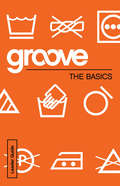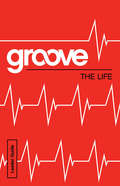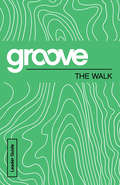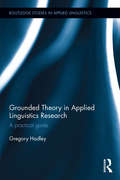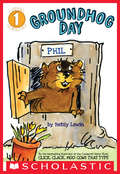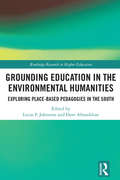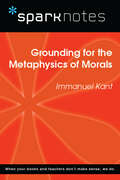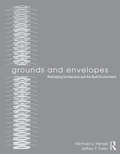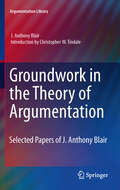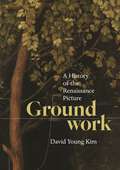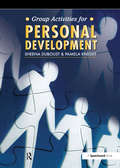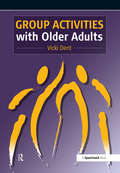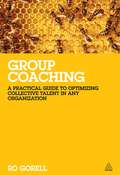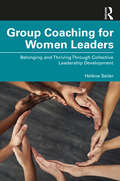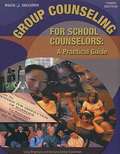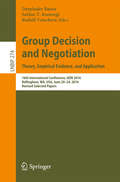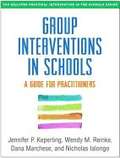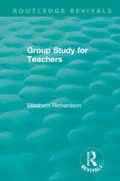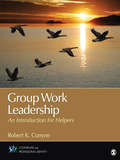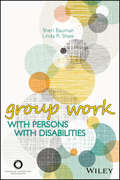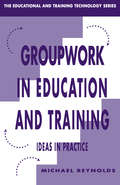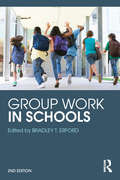- Table View
- List View
Groove: The Basics Leader Guide (Groove)
by Michael AdkinsToday’s faith and biblical illiteracy in general and among those who attend church and claim to be Christian is staggering. Some alarmists are claiming that the Christian faith is in danger of becoming extinct. We can no longer rely on culture to support the passing on of faith in Jesus Christ to the coming generations. The Basics study is not a quick fix to this situation. It is a handcrafted tool that when used by compassionate, caring, and committed adults, will ignite their imagination for God, the Scripture, the faith community, and living a transformed life.The Basics will likely raise more questions than it answers, and that’s intentional. Don’t feel the need to make sure all the loose ends are tied up at the conclusion of your youth gathering. Allow your teens the opportunity to leave with ideas and truths on which to reflect and wrestle as they use the daily devotionals provided in the Groove: The Basics Student Journal.The Groove Bible study series invites teens to learn the essentials of their faith, own their story, and engage the world in serving Jesus. Each topical study consists of four weekly sessions that are easy to lead and relate to life issues teens face. With up to 48 weeks available, Groove is great for Sunday and mid-week gatherings for both large and small groups as well as retreats. The leader guide contains everything needed to lead teens through a Groove study, including teaching outlines, leader notes, Bible background, reflections, and parent communication.
Groove: The Life Leader Guide (Groove)
by Michael AdkinsThe life of the Christian is marked by disciplines, practices, and commitments that help shape the foundation of our faith. So how do we help youth encounter and choose to embrace some of these practices as they move into a faith that they claim as their own?The Life is a four-week study designed to help youth consider spiritual practices and what those practices can mean in their lives. Each week, they will consider the practices of being committed to a church family, of prayer, of giving, and of sharing their faith with others. The ideas and lessons are reinforced with exercises and daily devotions, found in the Groove: The Life Student Journal, designed to help them reflect and apply these disciplines in their own lives.The Groove Bible study series invites teens to learn the essentials of their faith, own their story, and engage the world in serving Jesus. Each topical study consists of four weekly sessions that are easy to lead and relate to life issues teens face. With up to 48 weeks available, Groove is great for Sunday and mid-week gatherings for both large and small groups as well as retreats. The leader guide contains everything needed to lead teens through a Groove study, including teaching outlines, leader notes, Bible background, reflections, and parent communication.
Groove: The Walk Leader Guide (Groove)
by Michael AdkinsWhat does it look like to "walk with Jesus"? Like a great deal of church jargon we toss around, it can become a confusing concept for teens to embrace and understand.The Walk is designed to teach youth what it means to walk with Jesus. As their faith grows, they will learn to exercise the grace, love, patience, humility, and meekness found only in Christ. As a result, they will begin to own their faith, as it moves from something that they hear about to something that they are living in their own lives.The daily devotions of the Groove: The Walk Student Journal will encourage youth to embrace these concepts and experience a rich and fulfilled life as they learn to imitate Christ in their daily lives.The Groove Bible study series invites teens to learn the essentials of their faith, own their story, and engage the world in serving Jesus. Each topical study consists of four weekly sessions that are easy to lead and relate to life issues teens face. With up to 48 weeks available, Groove is great for Sunday and mid-week gatherings for both large and small groups as well as retreats. The leader guide contains everything needed to lead teens through a Groove study, including teaching outlines, leader notes, Bible background, reflections, and parent communication.
Grounded Theory in Applied Linguistics Research: A practical guide (Routledge Studies in Applied Linguistics)
by Gregory HadleyThis volume demystifies the procedures and practical uses of Grounded Theory, a well-established research methodology used around the world today by social scientists, teachers, and qualitative researchers. Intended for graduate students, supervisors, and researchers, it provides readers with the tools for understanding, justifying, and disseminating new theoretical insights for the Applied Linguistics community and beyond.
Groundhog Day: Groundhog Day (Scholastic Reader, Level 1)
by Betsy LewinWill Phil the groundhog see his shadow?It is Groundhog Day! Will Phil, the groundhog, see his shadow? Or is spring on its way? Read this fun, colorful story to find out what happens to the adorable groundhog! This Level 1 early reader is written and illustrated by Betsy Lewin, the bestselling illustrator of the Caldecott Honor Book CLICK, CLACK, MOO: COWS THAT TYPE.
Grounding Education in Environmental Humanities: Exploring Place-Based Pedagogies in the South (Routledge Research in Higher Education)
by Dave Aftandilian Lucas F. JohnstonThis edited volume draws together educators and scholars to engage with the difficulties and benefits of teaching place-based education in a distinctive culture-laden area in North America: the United States South. Despite problematic past visions of cultural homogeneity, the South has always been a culturally diverse region with many historical layers of inhabitation and migration, each with their own set of religious and secular relationships to the land. Through site-specific narratives, this volume offers a blueprint for new approaches to place-based pedagogy, with an emphasis on the intersection between religion and the environment. By offering broadly applicable examples of pedagogical methods and practices, this book confronts the need to develop more sustainable local communities to address globally significant challenges.
Grounding for the Metaphysics of Morals (SparkNotes Philosophy Guide)
by SparkNotesGrounding for the Metaphysics of Morals (SparkNotes Philosophy Guide) Making the reading experience fun! SparkNotes Philosophy Guides are one-stop guides to the great works of philosophy–masterpieces that stand at the foundations of Western thought. Inside each Philosophy Guide you&’ll find insightful overviews of great philosophical works of the Western world.
Grounds and Envelopes: Reshaping Architecture and the Built Environment
by Michael U. Hensel Jeffrey P. TurkoProviding a source of vision for the revitalisation of ground and envelope as spatial elements that can inform the search for embedded locally specific architectures, this book collects essays and projects that each contributes a particular element to what might constitute an integrated and richly nuanced approach to spatial organisation. Projects include: Paulo Mendes da Rocha; Brazilian Pavilion, Osaka World Expo 1970, Osaka, Japan RCR Arquitectes: Marquee at Les Cols Restaurant, Olot, Girona, Spain Weiss / Manfredi; Seattle Art Museum: Olympic Sculpture Park, Seattle, Washington, USA Peter Eisenman; City of Culture of Galicia, Santiago de Compostela, Spain Plasma Studio and Groundlab; Xi’an Horticultural Expo, Longgang, China Foreign Office Architects; Yokohama International Ferry Terminal, Yokohama, Japan Nekton Design; Turf City, Reykjavik, Iceland Alvaro Siza; Swimming Pool, Leça da Palmeira, Portugal Eduardo Souto de Moura; Braga Municipal Stadium, Braga Portugal MVRDV; Villa VPRO, Hilversum, Netherlands Bernard Tschumi; Le Fresnoy Art Centre, Tourcoing, France OCEAN; World Centre for Human Concerns, New York City, USA R&Sie(n); Spidernethewood, Nîmes, France Toyo Ito; Serpentine Pavilion, London, England Enric Miralles and Carme Pinós; Olympic Archery Range, Barcelona, Spain Kengo Kuma; GC Prostho Museum Research Centre, Aichi Prefecture, Japan Cloud 9; MediaTic, Barcelona, Spain Diller, Scofidio and Renfro; Blur Building, Yverdon-les-Bains, Switzerland, Swiss National Expo With an abundance of built and un-built key projects available, it is now possible to outline the contours of a new discourse. This book initiates a new beginning in this direction so that architecture can partake in the creation of heterogeneous space and culturally, socially and environmentally sustainable built environments.
Groundwork for College Reading (3rd edition)
by Bill BroderickGroundwork for College Reading, Third Edition, provides ten word and reading skills to help developmental college students, English as a second language students, and Adult Basic Education students to become independent readers and thinkers. Through an appealing collection of readings and a carefully designed series of activities and tests, students receive considerable guided practice in the skills. The result is an integrated approach to learning that will bring about better readers and stronger thinkers.
Groundwork in the Theory of Argumentation
by Christopher W. Tindale J. Anthony BlairJ. Anthony Blair is a prominent international figure in argumentation studies. He is among the originators of informal logic, an author of textbooks on the informal logic approach to argument analysis and evaluation and on critical thinking, and a founder and editor of the journal Informal Logic. Blair is widely recognized among the leaders in the field for contributing formative ideas to the argumentation literature of the last few decades. This selection of key works provides insights into the history of the field of argumentation theory and various related disciplines. It illuminates the central debates and presents core ideas in four main areas: Critical Thinking, Informal Logic, Argument Theory and Logic, Dialectic and Rhetoric.
Groundwork: A History of the Renaissance Picture
by David Young KimAn illuminating look at a fundamental yet understudied aspect of Italian Renaissance paintingThe Italian Renaissance picture is renowned for its depiction of the human figure, from the dramatic foreshortening of the body to create depth to the subtle blending of tones and colors to achieve greater naturalism. Yet these techniques rely on a powerful compositional element that often goes overlooked. Groundwork provides the first in-depth examination of the complex relationship between figure and ground in Renaissance painting.“Ground” can refer to the preparation of a work’s surface, the fictive floor or plane, or the background on which figuration occurs. In laying the material foundation, artists perform groundwork, opening the ground as a zone that can precede, penetrate, or fracture the figure. David Young Kim looks at the work of Gentile da Fabriano, Giovanni Bellini, Giovanni Battista Moroni, and Caravaggio, reconstructing each painter’s methods to demonstrate the intricacies involved in laying ground layers whose translucency and polychromy permeate the surface. He charts significant transitions from gold ground painting in the Trecento to the darkened grounds in Baroque tenebrism, and offers close readings of period texts to shed new light on the significance of ground forms such as rock face, wall, and cave.This beautifully illustrated book reconceives the Renaissance picture, revealing the passion and mystery of groundwork and discovering figuration beyond the human figure.
Group Activities for Personal Development
by Pamela Knight Sheena DuboustAimed at professionals working with groups that are developing social skills and exploring relationships, this photocopiable handbook is a vital collection of workshops covering specific themes. Each theme is clearly divided into warm-ups, main exercises and closures. Intended to help professionals save on preparation time, the organisation and format of this book reflects its highly practical content.
Group Activities with Older Adults
by Vicki DentIf you have responsibility for providing activities for older adults and you aren't sure whether what you are providing is effective, or you have exhausted all your own activity ideas then this book is for you. This clear and easy-to-use resource provides the tools you require to develop and implement a range of activities that meet the needs of your group. Structured around the ten areas of activity need - cognitive, creative, cultural, educational/employment, emotional, physical, self-esteem, sensory, social and spiritual - this book is a resource of activity ideas with hints, tips and suggestions for successful planning and delivery, and guidance on recording and evaluating activity programmes. It explores some of the adaptations required to meet the needs of younger clients, those with dementia, and those with communication difficulties. It is an ideal resource for anyone working with elderly people wanting to improve on an existing activity programme, or wishing to commence one.
Group Coaching
by Ro GorellGroup Coaching is a practical guide to developing effective group coaching practice to develop and grow talent.Based on over 40 years of HR, consulting and coaching practical experience, it provides a framework of best practice supported by a range of tried and tested group exercises and tools.With tools and case studies throughout it will provide everything you need to run successful group coaching sessions effectively and develop group coaching as a way of liberating talent throughout any organisation.
Group Coaching for Women Leaders: Belonging and Thriving Through Collective Leadership Development
by Hélène SeilerThis book is an invaluable resource for those looking to lead high-functioning women groups, and a testament to the power of group coaching for women leaders.Dr. Hélène Seiler advocates for the expansion of group coaching to support the fulfilment of women leaders, providing a comprehensive review of the relevant academic literature on group coaching for women leaders and an in-depth analysis of her reflective notes over the last 15 years. This book shares the author’s experience as an international group coach and an executive coach for women leaders, and echoes the voices of her former group members. Using case studies and practical tips, the author offers recommendations when forming a new collective of women leaders, shares best practices in high-functioning groups, provides solutions when dealing with breakdowns within a group, and provides guidelines to lead change when a group composition evolves. This book also addresses the potential impact of technology and artificial intelligence on the stakeholders of group coaching. Each chapter contains key points, multi-cultural case studies, and ends with reflective questions to enrich and personalize the reader’s learning experience.Group Coaching for Women Leaders is an essential resource for group coaches working with women leaders internationally, for academic leaders looking to extend their offerings for student coaches, and for corporate sponsors interested in augmenting the power of women leadership development initiatives in their organizations.
Group Counseling for School Counselors
by Greg Brigman Barbara GoodmanGet guidance for preteen and adolescent issues with this step-by-step, field-tested resource! Addresses topics such as social skills, academic support, conflict resolution, and more Applies group plans for each academic level elementary, middle, and high school Presents lessons in an easy-to-follow and developmentally appropriate style.
Group Decision and Negotiation. Theory, Empirical Evidence, and Application
by Deepinder Bajwa Sabine T. Koeszegi Rudolf VetscheraThis book constitutes revised selected papers from the 16th International Conference on Group Decision and Negotiation, GDN 2016, held in Bellingham, WA, USA, in June 2016. The GDN meetings aim to bring together researchers and practitioners from a wide spectrum of fields, including economics, management, computer science, engineering, and decision science. The 12 papers presented in this volume were carefully reviewed and selected from 70 submissions. They deal with the fundamental part of all decision processes and individual preferences; the situations of group decision making; the collective decision making in situations characterized by a higher level of conflict; and the group processes and negotiations in different subject areas.
Group Interventions in Schools: A Guide for Practitioners
by Dana Marchese Jennifer P. Keperling Nicholas Ialongo Wendy M. ReinkeNumerous group interventions have been shown to be effective for helping K-8 students who are struggling with--or at risk for--a wide range of mental health and behavior problems. This unique book gives school practitioners indispensable tools for making any evidence-based group intervention more successful. It addresses the real-world implementation challenges that many manuals overlook, such as how to engage children and parents and sustain their participation, manage behavior in groups, and troubleshoot crisis situations. User-friendly features include case examples, reflection questions, role-play scenarios, and 31 reproducible forms and handouts; the print book has a large-size format with lay-flat binding for easy photocopying. Purchasers get access to a Web page where they can download and print the reproducible materials. This book is in The Guilford Practical Intervention in the Schools Series.
Group Leadership Skills: Interpersonal Process in Group Counseling and Therapy
by Mei-Whei Chen Christopher J. RybakGroup Leadership Skills provides a road map and a practical toolkit for users to lead all types of groups effectively. Drawing on extensive teaching and clinical experience, authors Mei-whei Chen and Christopher Rybak give readers numerous skills, techniques, insights, and case illustrations demonstrating how to tap into the heart of group therapy: the interpersonal processes. The text covers group processes from beginning to end, including setting up a group, running the first session, facilitating the opening and closing of each session, working with tension and conflict, and using advanced skills and intervention techniques to facilitate member change. The Second Edition expands on group leadership skills to include methods of running mandate groups, semi-structured groups, basic level unstructured groups, and advanced level here-and-now focused groups, as well as using psychodrama techniques to heal unresolved grief and loss.
Group Leadership Skills: Interpersonal Process in Group Counseling and Therapy
by Mei-Whei Chen Christopher J. RybakGroup Leadership Skills provides a road map and a practical toolkit for users to lead all types of groups effectively. Drawing on extensive teaching and clinical experience, authors Mei-whei Chen and Christopher Rybak give readers numerous skills, techniques, insights, and case illustrations demonstrating how to tap into the heart of group therapy: the interpersonal processes. The text covers group processes from beginning to end, including setting up a group, running the first session, facilitating the opening and closing of each session, working with tension and conflict, and using advanced skills and intervention techniques to facilitate member change. The Second Edition expands on group leadership skills to include methods of running mandate groups, semi-structured groups, basic level unstructured groups, and advanced level here-and-now focused groups, as well as using psychodrama techniques to heal unresolved grief and loss.
Group Study for Teachers (Routledge Revivals)
by Elizabeth RichardsonOriginal blurb (1967): We are coming nowadays to think of education increasingly in terms of a prolonged transaction between the generations. The psychology of this transaction is largely concerned with learning as it is mediated by the relations between teachers and pupils. Thus the social psychology of the classroom and the school is a growing study which brings into focus the relations of adults and young persons in groups. There are a variety of approaches to the study of behaviour and experience in groups and to attempt to survey these would be a formidable task. Miss Richardson, herself a pioneer in this field, has attempted a more modest and practicable and in many ways a more useful task. She has set out to describe and illustrate a particular approach to the study of experience in groups. Based on her own work with groups of students in training as teachers, her book is a valuable introduction to one of the main streams of development in this field. The wealth of the illustrative material she provides should give students and experienced teachers deeper insight into many familiar situations in education.
Group Work Leadership: An Introduction for Helpers (Counseling and Professional Identity)
by Robert K. ConyneGroup Work Leadership: An Introduction for Helpers presents an evidence-based approach to the theory and practice of group work. Renowned counselor, psychologist, and group work fellow Dr. Robert K. Conyne advances this unique and evolving service in a three-part, comprehensive overview of the skills necessary for trainees of counseling and other helping professionals to succeed in group settings. Section I covers the breadth and foundations of group work; best practice and ethical considerations; dynamics and processes in group work; and how groups tend to develop over time. Section II explores group work leadership styles, methods, techniques, and strategies, as well as both traditional and innovative group work theories. Section III examines the role of reflection in group practice, as well as selecting effective intervention strategies in various settings.
Group Work With Persons With Disabilities
by Sheri Bauman Linda R. ShawThis one-of-a-kind manual provides direction for leading groups of people with disabilities or groups that have members with disabilities. Viewing disability as a single aspect of a multifaceted person, Drs. Bauman and Shaw share their insight and expertise and emphasize practical skill building and training for facilitating task, psychoeducational, counseling, family, and psychotherapy groups across various settings. Topics examined in Part I include common themes in groups that focus on disability; various group formats, including groups using technological platforms; issues of diversity that exist simultaneously with ability; group composition; ethical concerns; and training considerations and logistical accommodations. Part II focuses on group counseling with clients experiencing sensory, psychiatric, cognitive, and physical disabilities as well as chronic medical conditions. A list of resources, support information, and group exercises completes the book. *Requests for digital versions from the ACA can be found on wiley.com. *To request print copies, please visit the ACA website here. *Reproduction requests for material from books published by ACA should be directed to permissions@counseling.org
Group Work in Education and Training
by Michael ReynoldsSupplies the educational or vocational teacher with advice on the effective and successful running of a training group. The author uses a number of anecdotes from his own experience as a trainer to illustrate group work sessions and structured group activities of various kinds.
Group Work in Schools
by Bradley T. ErfordSchool counselors are often the only employees in school settings with any formal education in group work, and yet their training is typically a general course on how to run groups. Group Work in Schools provides an alternative training model; one that presents exactly what counselors need to know in order to successfully implement task-driven, psychoeducational, and counseling/psychotherapy groups in any educational setting. Additions to this newly updated second edition include: discussion topics, activities, case examples, integrated CACREP standards and learning outcomes, as well as an overall update to reflect the most recent research and knowledge.
